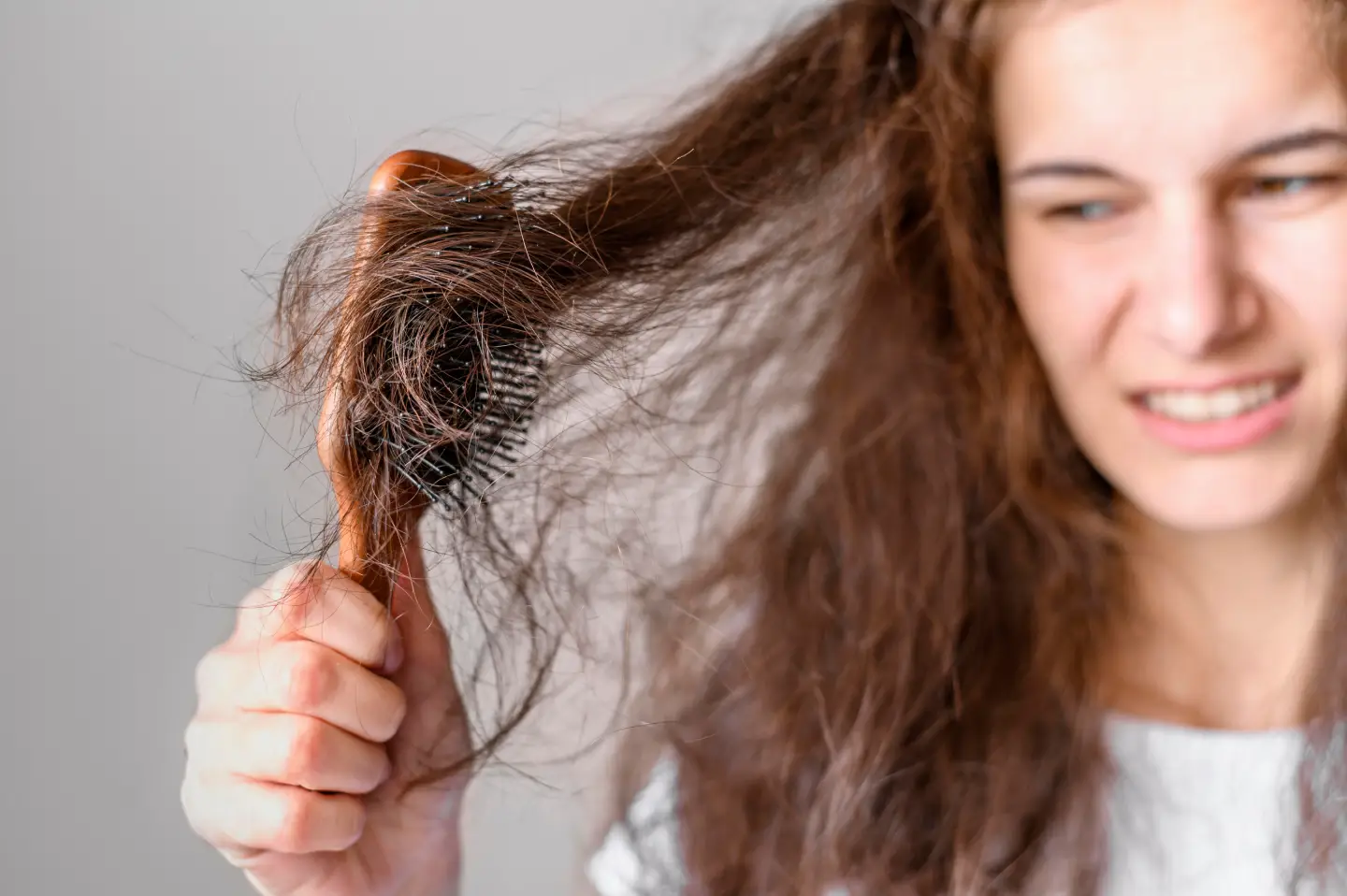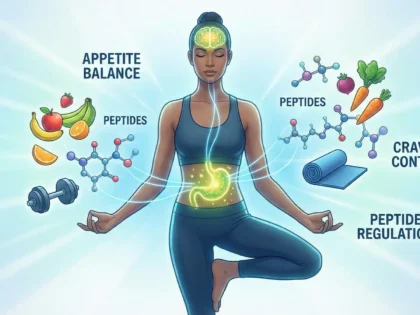Hair Loss and The Effective Ways to Regain 2025
-
PepEurope
- Posted on
- 0 comments

Hair loss is a common experience that affects both men and women at different stages of life. While losing between 50 to 100 strands a day is completely normal, noticing excessive shedding, bald patches, or thinning hair can be distressing.
For many, hair is more than just appearance, it’s tied to self-confidence, identity, and overall wellbeing. Although hair loss is usually not a sign of serious illness, understanding its causes and knowing which solutions are available can make it easier to manage.
Understanding Hair Loss
Hair follows a natural growth cycle that includes growing, resting, and shedding phases. Most people shed some hair daily without even noticing. However, when the balance between growth and shedding is disrupted, noticeable thinning begins.
- Temporary hair loss: Often triggered by stress, illness, or deficiencies. In many cases, the hair grows back naturally once the underlying cause is resolved.
- Permanent hair loss: Usually related to genetics (male or female pattern baldness). This type tends to progress gradually over time.
Recognizing which type you have is the first step toward choosing the right solution.
Table of Contents
Sema Beauty & Slim (weight control / healthy skin)
Sema Metabolic Boost (Appetite / Metabolism / Energy)
Metabolic Boost Duo (Appetite Suppression / Energy / Metabolism)
Sleep and Slim Pack (weight control / sleep regeneration)
Why People Lose Hair
Hair loss affects both men and women, though the patterns and causes can differ. In men, male pattern baldness or androgenetic alopecia is the most common cause. It is primarily driven by genetics and hormones, especially dihydrotestosterone (DHT), which shrinks hair follicles over time, resulting in thinner hair and gradual hair loss.
For women, hair thinning often occurs more diffusely across the scalp rather than in distinct patterns. Hormonal changes, such as those during pregnancy, menopause, or conditions like polycystic ovary syndrome (PCOS), can significantly impact hair growth. Women may also experience hair loss from stress, illness, or nutritional deficiencies, which can temporarily weaken hair strands.
Other common factors for both genders include aging, certain medications like chemotherapy or steroids, and underlying medical conditions such as thyroid disorders or autoimmune diseases. Lifestyle factors, including stress, poor nutrition, and lack of proper hair care, can further accelerate hair loss.
Ultimately, hair loss is often a combination of genetic predisposition, hormonal influences, medical conditions, and lifestyle factors, which is why its onset and severity can vary greatly between individuals.
Common Causes of Hair Loss
There isn’t a single reason why hair loss happens. Instead, it’s often a combination of genetics, lifestyle, and health factors.
- Genetics: Hereditary baldness is the most common form, often starting with a receding hairline or thinning crown.
- Medical conditions: Problems such as thyroid disease, alopecia areata (autoimmune disorder), or iron deficiency anemia can trigger hair loss.
- Stress and lifestyle: High stress, poor sleep, crash diets, or sudden weight changes often result in temporary shedding.
- Medications and treatments: Chemotherapy, certain hormonal therapies, or long-term medication use may also cause hair thinning.
Knowing the cause helps determine whether the hair will grow back naturally or needs treatment.
Sema Beauty & Slim (weight control / healthy skin)
Sema Metabolic Boost (Appetite / Metabolism / Energy)
Metabolic Boost Duo (Appetite Suppression / Energy / Metabolism)
Sleep and Slim Pack (weight control / sleep regeneration)
When to See a Doctor
Hair loss can sometimes be a clue to an underlying health issue. You should consult a doctor if:
- Hair loss occurs suddenly or in patches.
- You notice excessive shedding after brushing or washing.
- The scalp feels itchy, painful, or inflamed.
- Hair loss is affecting your mental wellbeing.
Your GP can run tests, identify possible medical conditions, and advise on the most appropriate treatments.
NHS-Recognized Hair Loss Treatments
While not every form of hair loss requires treatment, some proven options exist:
- Finasteride & Minoxidil: Finasteride (for men only) and Minoxidil (for both men and women) are the most widely used treatments. They can slow hair loss and sometimes promote regrowth, but results vary and only last while the treatment continues.
- Wigs: Synthetic wigs are affordable and easier to care for, while natural hair wigs look more realistic but are more expensive. Some NHS support may be available.
- Steroid injections or creams: Useful for certain autoimmune-related bald patches.
- Immunotherapy & UV light therapy: Stimulate the scalp to encourage growth in some cases.
- Micropigmentation: A cosmetic tattoo that mimics the look of short hair.
- Surgical options: Hair transplants, scalp reduction surgery, or artificial implants are available, though often privately.
Not every option is suitable for everyone, and consultation with a healthcare professional is key.
Lifestyle & Natural Approaches to Manage Hair Loss
Not all solutions come in the form of medication. Lifestyle changes can have a significant impact:
- Nutrition: Ensure your diet includes iron, zinc, protein, and vitamins like B6 and B12.
- Stress management: Practices such as yoga, mindfulness, or regular exercise help lower stress that contributes to hair shedding.
- Sleep: Consistent, quality sleep helps regulate hormones and supports hair follicle recovery.
- Gentle care: Avoid harsh hair treatments, heat styling, or tight hairstyles that damage follicles.
Even if these steps don’t reverse genetic baldness, they often slow down hair loss and improve scalp health.
Sema Beauty & Slim (weight control / healthy skin)
Sema Metabolic Boost (Appetite / Metabolism / Energy)
Metabolic Boost Duo (Appetite Suppression / Energy / Metabolism)
Sleep and Slim Pack (weight control / sleep regeneration)
Emotional & Psychological Support
Hair loss isn’t just physical, it can take a real emotional toll. Feelings of anxiety, low self-esteem, or embarrassment are common. Options such as wigs, hairpieces, and cosmetic solutions can help in boosting confidence, while counseling and support groups can provide reassurance for those struggling emotionally.
Future of Hair Loss Treatments
Medical research continues to explore new solutions. Advances in stem cell therapy, platelet-rich plasma (PRP), and regenerative medicine show promise.
Scientists are also investigating genetic editing and better medications with fewer side effects. The future may bring safer, more effective, and lasting ways to restore hair.
FAQs About Hair Loss
What are the solutions to hair loss?
Hair loss solutions vary depending on the cause and severity. Common approaches include topical treatments like minoxidil, oral medications such as finasteride (for men), hair transplant procedures, steroid injections for patchy hair loss, and lifestyle adjustments like improving diet and reducing stress. Wigs or hairpieces are also an option for cosmetic purposes.
How to fix hair loss?
Fixing hair loss begins with identifying the underlying cause. In case of temporary hair loss due to stress, illness, or nutritional deficiency, the hair may regrow naturally after the condition is resolved. For this, you need to get enough sleep first, and if you have trouble sleeping, you can try Sleep Restore Complex! Most people have given positive feedback about it. And they have also said that it has helped them sleep well! And also hair may regrow naturally once the condition is addressed.
For genetic hair loss, treatments like minoxidil, finasteride, or hair transplantation can help slow or reverse the progression. Maintaining a healthy lifestyle, managing stress, and using gentle hair care products also support hair health.
What is the most successful treatment for hair loss?
The most successful treatment depends on the individual. For male pattern baldness, finasteride and minoxidil are widely regarded as effective. Hair transplant surgery is also a permanent solution for certain types of hair loss. For women, minoxidil is the primary FDA-approved treatment, while hormonal therapy may be effective in specific cases.
How to regrow hair 100%?
There is currently no guaranteed way to regrow hair 100% for everyone. Results vary depending on the cause, genetics, and treatment method. Early intervention, consistent treatment, and a combination of therapies often provide the best chances of noticeable regrowth.
Which vitamin is good for hair?
Vitamins and minerals play a key role in healthy hair growth. Essential nutrients include biotin (Vitamin B7), Vitamin D, Vitamin E, Vitamin C, zinc, and iron. A balanced diet rich in these vitamins can help prevent hair thinning and maintain overall hair health.
What is the new treatment for hair loss 2025?
Recent developments in 2025 focus on advanced therapies like stem cell treatments, platelet-rich plasma (PRP) therapy, and new topical formulations targeting hair follicle regeneration. Research also highlights the role of neurohormonal support and natural compounds that enhance the hair growth cycle.
What is the Big 3 treatment for hair loss?
The Big 3 treatment for hair loss generally refers to a combination of finasteride, minoxidil, and ketoconazole shampoo. This approach addresses hormonal factors, stimulates hair growth, and reduces scalp inflammation, providing a comprehensive strategy for male and female hair loss.
Is minoxidil safe?
Yes, minoxidil is considered safe for most people when used as directed. Side effects are usually mild, such as scalp irritation or itching. Rarely, systemic side effects like dizziness or heart palpitations may occur. Women should only use formulations designed for female use.
What is the new protein for hair loss?
New research has identified proteins involved in hair follicle regeneration and stem cell activation, such as fibroblast growth factor (FGF) and Wnt pathway proteins. These proteins are being studied for future treatments to promote hair regrowth and prevent follicle miniaturization.
Sema Beauty & Slim (weight control / healthy skin)
Sema Metabolic Boost (Appetite / Metabolism / Energy)
Metabolic Boost Duo (Appetite Suppression / Energy / Metabolism)
Sleep and Slim Pack (weight control / sleep regeneration)
The Role of Sleep in Hair Health
Sleep is a critical factor in regulating hormones, repairing tissues, and supporting the body’s natural growth cycles including hair follicles. Chronic insomnia or disrupted sleep increases cortisol levels, a stress hormone linked to hair thinning. When sleep improves, the body has more time for cellular repair, including scalp and hair regeneration.
Sleep Restore Complex for Hair Loss Solutions
At PepEurope.net, we believe true solutions for hair health go beyond external treatments. They start with supporting the body from within. That’s why we Suggest Sleep Restore Complex, a research-based formula designed to improve natural sleep quality and neurohormonal balance.
This innovative complex includes:
- Melatonin & L-Tryptophan help regulate circadian rhythm and promote deeper sleep.
- GABA & Plant Extracts (Ashwagandha, Passiflora) reduce tension and calm the nervous system.
- Magnesium & Vitamin B6 support neurotransmitter balance and overall regeneration.
While the product is classified strictly as a research reagent and not for direct human consumption, its carefully designed formulation is based on scientific insights into sleep and nervous system recovery.
How Sleep Restore Complex Supports Hair Health Research
Research suggests that healthy sleep is strongly tied to reduced stress, better hormone regulation, and improved tissue recovery, all essential factors in slowing or preventing hair loss.
Potential actions explored in scientific studies include:
- Reducing stress hormones (cortisol) that weaken hair follicles.
- Supporting deep sleep phases, when the body repairs cells and clears toxins.
- Promoting neurotransmitter balance, which influences growth cycles.
- Encouraging overall regeneration, benefiting not only the nervous system but also skin and hair structures.
By understanding these connections, researchers are uncovering how restoring healthy sleep patterns can support both wellbeing and hair resilience.
Conclusion
Hair loss may be distressing, but it is rarely something to fear. With the right knowledge, lifestyle adjustments, and treatment options from medical therapies like Minoxidil and Finasteride to wigs, transplants, or supportive research-based solutions, it’s possible to manage hair loss effectively.
Most importantly, taking care of overall health, including stress reduction and quality sleep, plays a powerful role in maintaining not only your hair but also your confidence and wellbeing.















